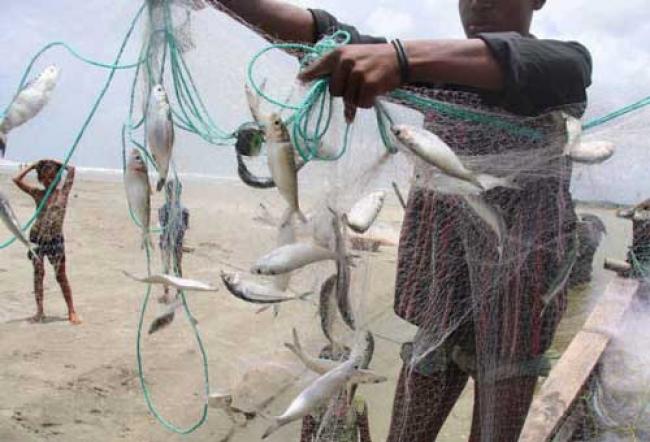Economy
World / Countries / MNCs Fish profits not reaching small-scale farmers: UN
22 Feb 2014, 10:36 am Print

New York, Feb 22 (JEN): The international fish trade is breaking records, the United Nations on Friday reported, but the benefits of the trade are not trickling down to the small-scale fishing communities which make up the majority of the sector’s global workforce.
“The proportion of fish production being traded internationally is significant, at around 37 per cent in 2013,” said Audun Lem, Chief of UN Food and Agricultural Organization’s (FAO) Products, Trade and Marketing Branch. “This makes the fisheries sector one of the most globalised and dynamic industries in world food production.”
Global fishery production from wild capture fisheries and aquaculture is expected to set a new record in 2013 at 160 million tonnes, up from 157 million tonnes the previous year, while exports will reach USD 136 billion.
The figures are part of preliminary data published ahead of the FAO Sub-Committee on Fish Trade meeting in Bergen, Norway, next week.
“The record trade figures reflect the strong growth in aquaculture output and the high prices for a number of species such as salmon and shrimp,” said Lem. “This is underpinned by firm underlying demand for fish products from world markets.”
The benefits from international trade are not always reaching small-scale fishers and fish farmers, who constitute about 90 per cent of the sector’s global workforce and half of whom are women, FAO reported.
The Rome-based agency urged the Government to provide small-scale fishers, who often employ women, with access to finance, insurance and market information, invest in infrastructure, strengthen small-scale producer and trader organizations, and ensure that national policies do not overlook or weaken the small-scale sector.
“There are exciting opportunities in regional markets at the moment as emerging economies such as Mexico, Brazil, Indonesia and Malaysia want more fish and are looking to their neighbours to supply it,” Lem said. “At the same time, this growing demand is stimulating new investments in local aquaculture production, including in Africa.”
The report also highlights that more by-products, such as heads, viscera and backbones can potentially be turned into valuable products also for human consumption.
Photo: IRIN/Shamsuddin Ahmed
More Economy
- Automobile giant Tesla likely to remove 10 percent of its workforce
- Crypto market tanks amid Middle East crisis
- Elon Musk's Tesla inks strategic deal with India's Tata Electronics to procure semi-conductor chips
- Apple plans to reduce 614 workers in California
- Tech major Apple to open its new Shanghai store on Thursday






